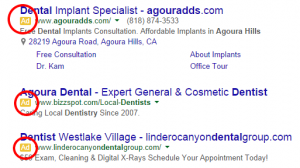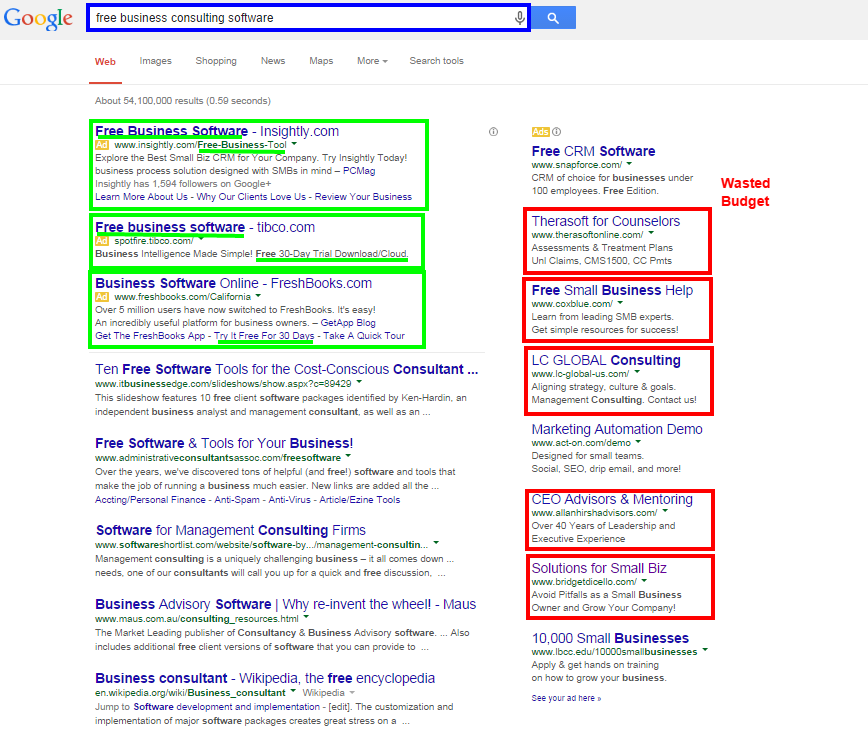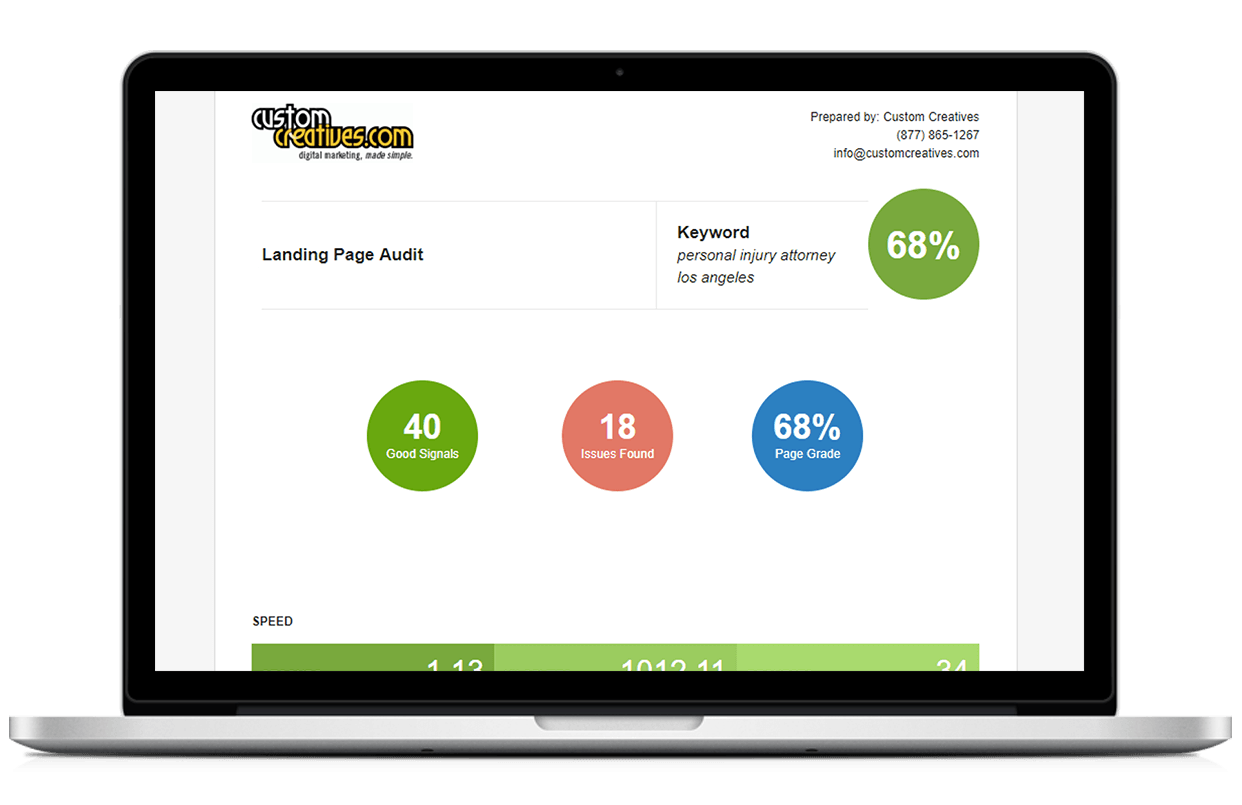
Paid ads in Google search results.
What is PPC?
Pay Per Click (PPC) is a term that gets mentioned constantly, but what exactly is it? It’s also called sponsored ads, paid ads, sponsored search results, etc. Basically, these are the search results you see at the top and on the side of the search results pages. On Google, you’ll know them by the small yellow square with the word “Ad” inside it.
Why do small businesses love PPC?
PPC can have a major impact on revenue. When done right, PPC has the potential to bring returns far beyond the cost of paying for those clicks, and in some cases, has no limit. The only limits to profitability are the real-world, physical limits a business may encounter. If more profits just means more ability to produce, then PPC could conceivably produce infinite returns.
PPC ads help small businesses compete with large businesses on an even playing field – the ads from all businesses of all sizes share the same search results pages, giving every business with a PPC budget a chance to compete for a user’s attention.
Benefits of a PPC campaign:
Some of the more common benefits of a paid search strategy include:
- PPC provides a quick boost of interested web traffic.
- PPC is a reliable source of traffic within a predictable budget.
- Many PPC platforms self-optimize for greater performance.
- PPC can target extremely granular details, including a narrow location (by city or even zip code) and exact keyword interest.
- With PPC, a business will only pay money for clicks; impressions are free brand exposure.
Things to watch out for:
Beware of PPC pitfalls and rookie mistakes…
- Make sure you’re getting any leads that come in so no one gets missed. (Always test your own web forms and phone numbers!)
- Auto-optimizing is not fully intelligent. It still requires human attention. Auto-optimization targets user behavior and performance based on what you’re able to tell the publisher, but not all details of your business can get through. Make sure the auto-optimizer isn’t targeting the clicks that don’t convert to sales in the real world.
- Be sure to use the right negative keywords — don’t spend money on the wrong traffic! Avoid “How to,” “DIY,” or “Free” search queries.
Shown on the image below are results for a “free business consulting software” search. The green listings are truly relevant — they contain free offers and they have the offer and limitations on the ad itself, giving users the right incentive to click over and win their business. The red listings, on the other hand, are NOT free offers. None of those offer anything for free, and a user who clicks one of those links is not likely to convert, because that user was searching for free software.

If you’re not offering something for free, don’t pay money for clicks from users who are looking for something free!
You will want to make sure you spend your dollars towards profitable opportunities and eliminate waste along the way. If you’re already spending money on ads, do yourself a favor and evaluate what searches are bringing you the most clicks. Are they relevant searches? Are they converting into sales?
A successful PPC campaign is based on these primary core elements:
Whether you’re ready to start a new PPC campaign or you already have one and it’s time for an audit, keep these important elements in mind:
- The right keyword selection – Focus on intent based phrases so you acquire more conversions. Eliminate any negative phrases you don’t want to appear on. Avoid “How To”, “Do-it-Yourself” and “Tutorial” based phrases (i.e. “How to Install Your Own Kitchen Cabinets”). Use your awesome and insightful blog to educate and attract this type of traffic. The goal for your PPC campaign should be focused on conversions – especially since you are probably working on a fixed monthly budget.
- Creating smart ad groups – Keep like with like. Your keywords will have a better quality score if you group them together in tighter, more clearly-relevant groups than if you lump them all together in one big group. Take the time to segment them out.
- Geo-targeting the right areas – Make sure you are targeting areas where you do business if you are on a budget. If you’re trying to break ground in a new city or state, by all means, do it! We encourage you to stay focused where you see your best opportunities. Typically this is in and around your home office or physical location. If you own an internet company, you may have a wider audience to cover.
- Providing the right ad copy – The copy that appears helps with conversions and improves your quality score. When you appear on a search result with a high click through rate and a lower bounce rate on your website, this helps improve your quality score on the search results for paid advertisers. Google will award you with better placement at lower costs for being more relevant, which gives your potential customers a better experience. Note: you don’t necessarily have to bid higher to place higher up the list.
- Targeting the right landing page – Your selection of landing page will influence your quality score, which can help lower your cost per click and boost your average position on search results page, but more importantly, the landing page is your visitors’ first impression. It absolutely must the best choice to offer solutions to their needs. The wrong landing page can result in higher bounce rates and wasted budget.
- Allocating the right budget – If you want to compete and win customers, budget is a key part of the equation. Since we are competing to buy media efficiently in a competitive market place, your budget must be in line with not only the competition, but also with your understanding of your ROI over time. You don’t have to have as high a budget as the biggest players in the space, but you do have use your budget as smartly.
- Allowing the right amount of time – Success doesn’t happen in a day or week. It’s a process over time. PPC is popular for its quick results, and certainly it can bring a big boost in traffic within a very small time frame, but a boost in traffic doesn’t always equate to immediate sales. Plan a long-term strategy for the best return on your marketing investment.
When to start a PPC campaign:
Start your PPC campaign when…
- You need targeted traffic and want it quickly.
- You have a new product or service to advertise.
- Your competitors are advertising a new product or service.
- You want to brand yourself as the expert.
- You want to test your SEO keyword strategy to validate what phrases convert.
How to get started:
- Evaluate your short-term business needs. Think about how meeting these short-term needs will benefit your business in the long run.
- Evaluate your own website. Are there pages that would serve as good landing pages for new traffic? If not, can you create new pages, or will you need assistance from a third party to produce a valuable landing page?
- Evaluate your budget. Can you invest appropriately? You’ll need to determine how much you can spend per month, and for how many months.
- Evaluate your customer base. Who are they, and what do they need? This will help you determine where you want your ads to appear, when you want your ads to appear, what copy you want included in your ads, and what landing page your ads should direct them to.
Advertise and succeed!
Google AdWords and Bing Ads are free to use – you can set up free accounts if you’re a real do-it-yourselfer. Otherwise, you can contact us and we can get you started – complete with a site evaluation and recommendations on landing pages if you like!
PPC stands on its own as an excellent source for new traffic to your website. Of course, as with all branches of digital marketing, it works best as part of a holistic approach, alongside SEO, retargeting, display ads and other channels.
Want to get a free PPC recommendation?
Call (818) 865-1267 or fill in our general form HERE!
(When we say free, we mean it! No hassles, just recommendations.)
Click here to read more about Pay Per Click advertising!
Author:
Rahul Alim
Custom Creatives was established to serve as your full-service one-stop Digital Marketing Company, offering graphic design, web design and web development agency, catering to businesses of all sizes. Custom Creatives has designed and deployed over 100,000 banner ads, as well as thousands of websites and landing pages and print collateral for small businesses and large international corporations. Providing exceptional quality services and products with a high return on investment is at the heart of everything we do.

